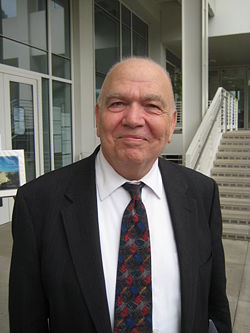

YEREVAN — Professor Richard G. Hovannisian, AEF Chair in Modern Armenian History at UCLA, delivered a lecture on Woodrow Wilson’s Arbitral Award in Yerevan last week.
Under the Wilson’s Arbitral Award, Armenia was granted the provinces of Van, Bitlis, Erzurum, and Trabzon. US President Woodrow Wilson issued the Arbitral Award on November 22, 1990, while the Supreme Council of the Allied Powers had decided to apply to the President in April.
In reality, this was a trap, Richard Hovhannisian stated. “They (the Supreme Council) waned to lay the responsibility for the Armenian Cause on Woodrow Wilson. What’s surprising is that Wilson fell into that trap. Why, if he knew that the US Senate would never accept that mandate? Senators were advising him not to pose the question, as it could turn worse for Armenians.”
Wilson is a hero for Armenians today. However, his political mistakes further contributed to the Armenian tragedy. “Look, the Supreme Council applied to him in April, but the directive came to Senate only in November. Wilson signed it in ten days, it was sent to the US Ambassador in December. When the decision was handed to the great powers, the Republic of Armenia had already stopped existing.”
Part of Armenia was conquered by the Turkish army. The other part voluntarily declared a Soviet Socialist Republic on December 2, 1920, which is now the Republic of Armenia. “If the Arbitral Award was implemented, it would grant Armenia 160 000 square km instead of the current 30 000.”
As for the Treaty of Sevres, it was not ratified by any country. It was followed by the Treaties of Moscow and Kars, as well as the Treaty of Lausanne of 1923, with which the great powers actually buried the Armenian Cause.
Thus, Richard Hovhannisian does not attribute any legal importance to Wilson’s Arbitral Award. He says, however, that the Armenian authorities must use the document as a diplomatic tool and draw lessons from the past not to face similar problems in the future.
Professor Richard Hovannisian: Woodrow Wilsons Arbitral Award Has No Legal Power
- No comments
- 2 minute read
Pashinyan’s Visit to Turkey and Beyond
By KRIKOR KHODANIAN At the invitation of Turkish President Recep Tayyip Erdoğan,…
- MassisPost
- June 29, 2025
- No comments
- 3 minute read
“I Still Can’t Believe What Happened on June 20”
By LUSYEN KOPA Exactly three months ago, I wrote an article titled…
- MassisPost
- June 26, 2025
- No comments
- 4 minute read
Anniversary of the Immortality of the Twenty Hnchakian Heroes
By KRIKOR KHODANIAN 110 years ago these days, the prominent figures of…
- MassisPost
- June 15, 2025
- No comments
- 3 minute read
The Eternal Memory of the Twenty Heroes
By BARKEV TAVITIAN Every year on June 15, the global Hnchakian family…
- MassisPost
- June 13, 2025
- No comments
- 3 minute read









